#actually the only other spider man I will accept doing his own taxes is Peter Porker
Text
Miguel O’Hara is the only spider-man who has previously had to do his own taxes but he hasn’t actually had to do his own taxes in however long it’s been since he destroyed a whole dimension and decided interdimensional canon cop was his new full time job and I think that’s why he is the way he is
#spider man#rewatched atsv last night and this is the conclusion I have drawn#‘surely Peter b has had to do his own taxes’ have you seen that man. absolutely he does not.#May did them then MJ did them and then he accidentally committed tax fraud after he got divorced#he spent three hours trying to figure out how to write off his suit materials as a business expense without giving up his secret identity#and then gave up and cried in the bathtub again and anxiety-shunted it out of his mind#anyway the point is Miguel O’Hara has both ‘i am an adult man with a job surrounded by wisecracking teenagers’ energy#but his full time job is Dramatic Interdimensional Spider Man Coordinator#and deep in his heart he does not know how much dignity that really affords him#actually the only other spider man I will accept doing his own taxes is Peter Porker#bc it’s distinctly funnier if the cartoon pig is the one with adult responsibilities
1 note
·
View note
Photo
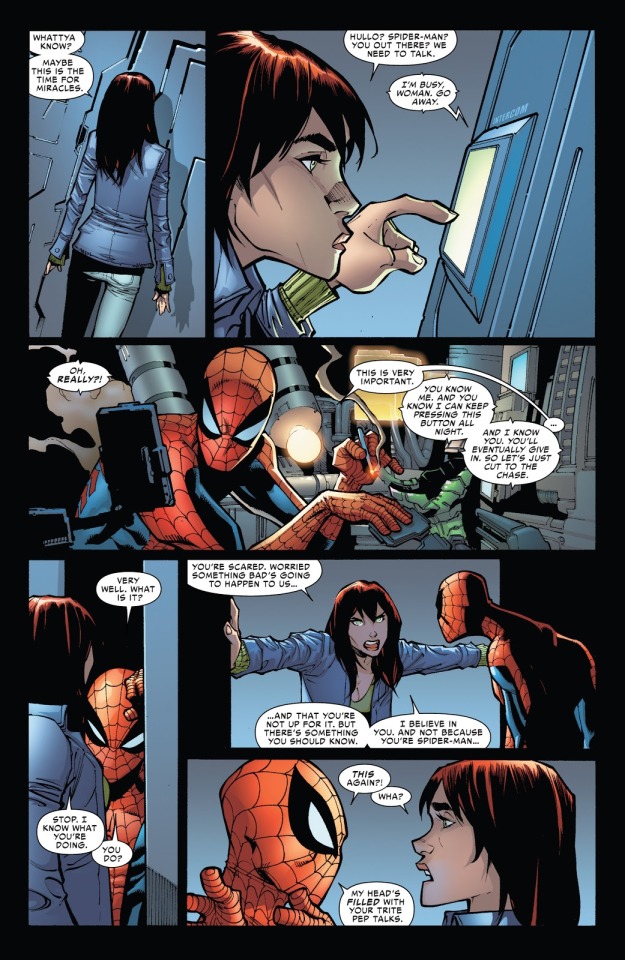
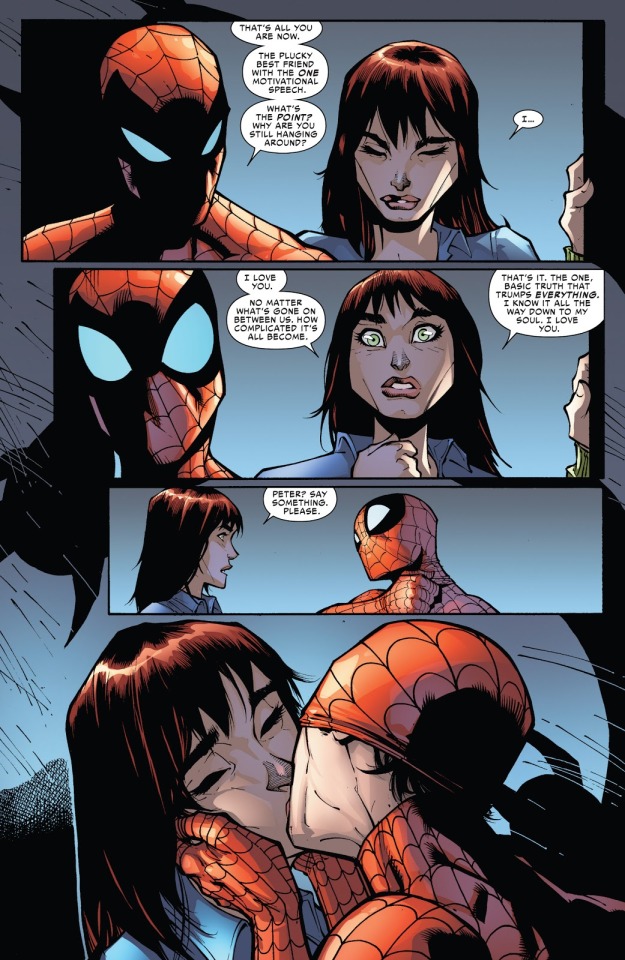
There is so much to say about this. Much of it is obvious. It’s gross. It’s spiteful on Slott’s part. But the thing I want to talk about is how it was one of countless examples of plot over character. Of contrivance over logic. Of MJ being written like a dumbass so she wouldn’t realise Peter is not right.
When has Peter ever spoken to MJ that exact way?
Never.
And yet someone I used to respect on Spider-Man matters actually defended this moment.
The crux of their argument was that MJ wouldn’t have suspected anything about ‘Peter’ because of the situation.
As in, to MJ the stress and danger of his the Sinister Six going directly after him and his loved ones is what caused Peter to talk to her this way.
Let’s unpack that idea.
First of all, outside of jest (and even then only like occasionally at best), Peter has never called MJ ‘woman’ before.
Second of all Peter has never insulted MJ in this way outside of the following situations.
ASM #122. This is perhaps when Peter was at his nastiest with MJ. I’m sure I need not spell out the context but for the record I’ll do it anyway. MJ’s friend, Peter’s would-be fiancée has just died. Murdered by the Green Goblin. Peter has come home to find MJ there. At this point MJ has seemed nothing more than a carefree party girl to Peter, someone who from his POV played with Harry’s heart and put the moves on him in spite of knowing about how Harry felt about her and how he and Gwen felt about one another.
He lashes out at her and viciously insults her, demanding she leave.
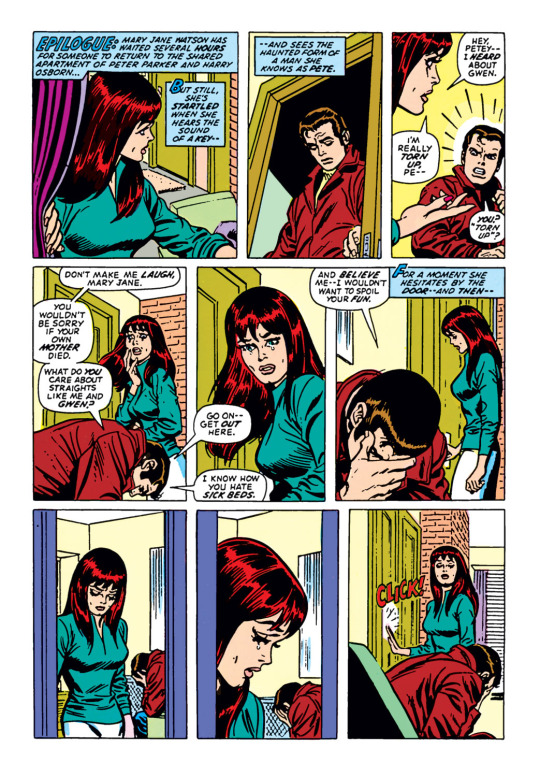
For the sake of argument let’s ignore later retcons about MJ’s past and knowledge of Peter’s identity.
In this situation Peter’s attitude is perfectly understandable and MJ was always aware of that. From MJ’s POV perhaps she has been out of line, but even if you disagree with that she’d know that Peter is emotionally devastated in this moment. He’s grieving from a immense wound that’s only a few hours old.
That is not the context for ASM #700. In ASM #700 he’s not grieving. From MJ’s POV he might be scared and stressed but it’s a million miles from being as bad as Gwen’s death.
Also this was when they were both much younger and when they had yet to have a serious romance. Before they shared a lifetime of trauma and tragedy that bonded them together and made them closer. That is surely a factor worth considering his actions in ASM #700.
Later in the same run we have ASM #127 when Peter chastised her for not turning in evidence after witnessing a murder. Peter in this instance was trying to deliberately provoke MJ so she’d get over her fear, get better protection for herself and ultimately do the right thing.
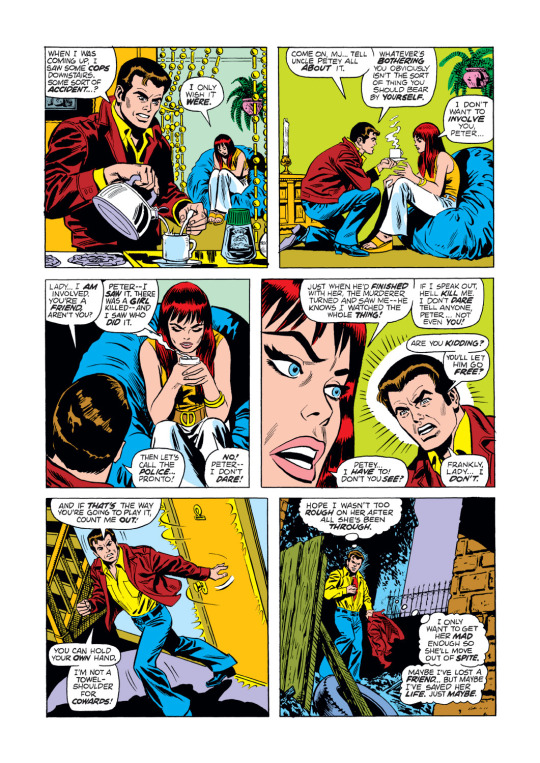
MJ herself might not have been aware specifically of what Peter was doing here. But the context was still starkly different to ASM #700.
Here it is MJ who is stressed ad scared, not Peter. From her POV Peter’s insults are coming from a place of moral outrage not frustration or fear. With hindsight MJ would also know that Peter was Spider-Man at this time and so was looking out for her, someone very capable of handling the Vulture. His moral outrage would also make more sense in hindsight as MJ is in effect replicating his own mistake from AF #15.
So again, not a comparable situation.
How about ASM #318? This was when they were married. In this story an unemployed MJ has spent yet another night partying. Peter gets passive aggressive when he calls her out on this and they have a brief argument.

First of all, this instance is very different to Peter’s insults in ASM #700. He wasn’t being passive aggressive there at all and much more hurtful. Additionally MJ was running away from her problems and in the wrong in this instance. That is not the same thing as Peter being stressed and scared and lashing out.
Next up we have Spec #199 and #200 where Peter and MJ have two blazing arguments.
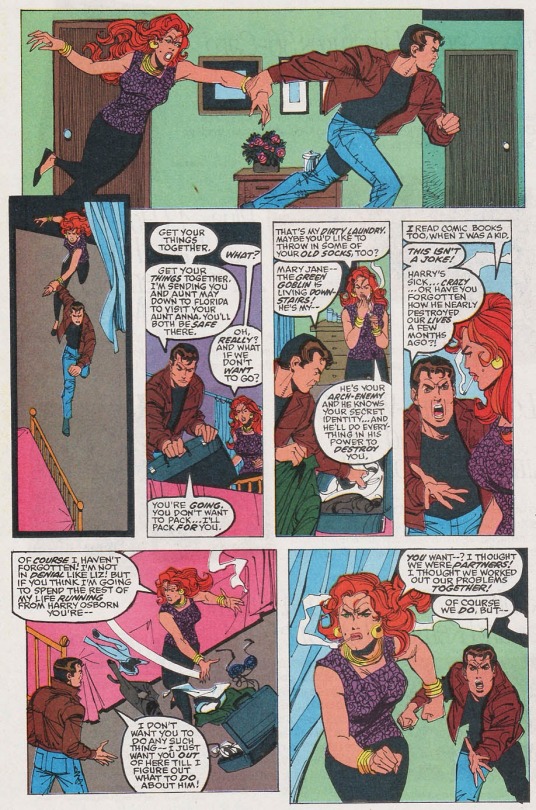
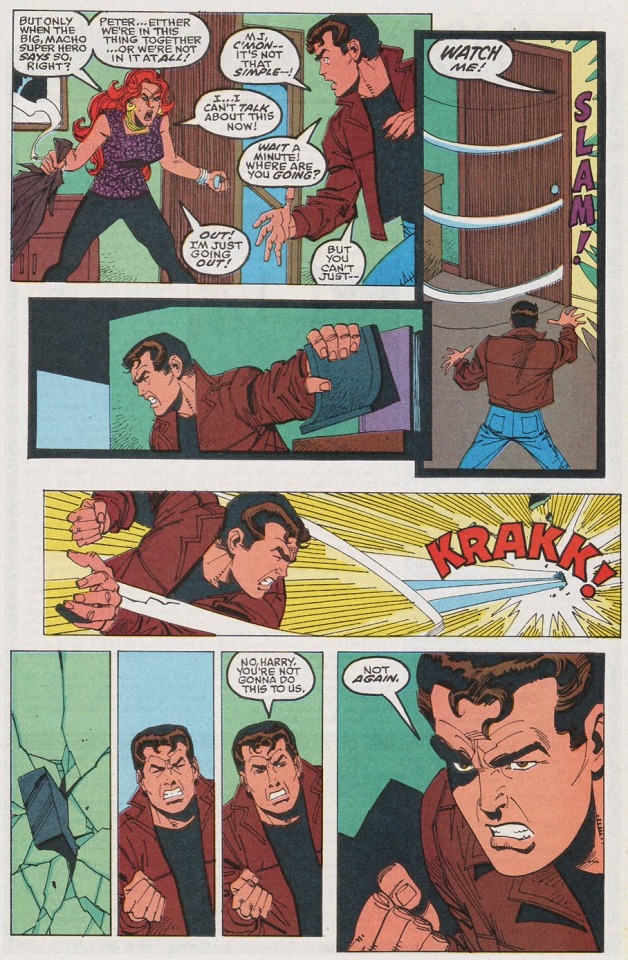
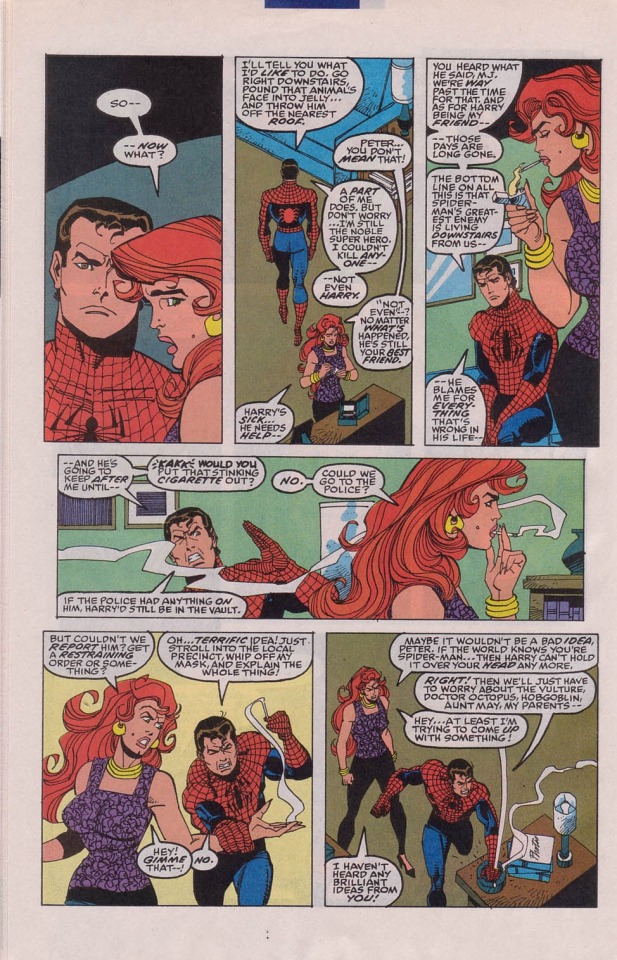
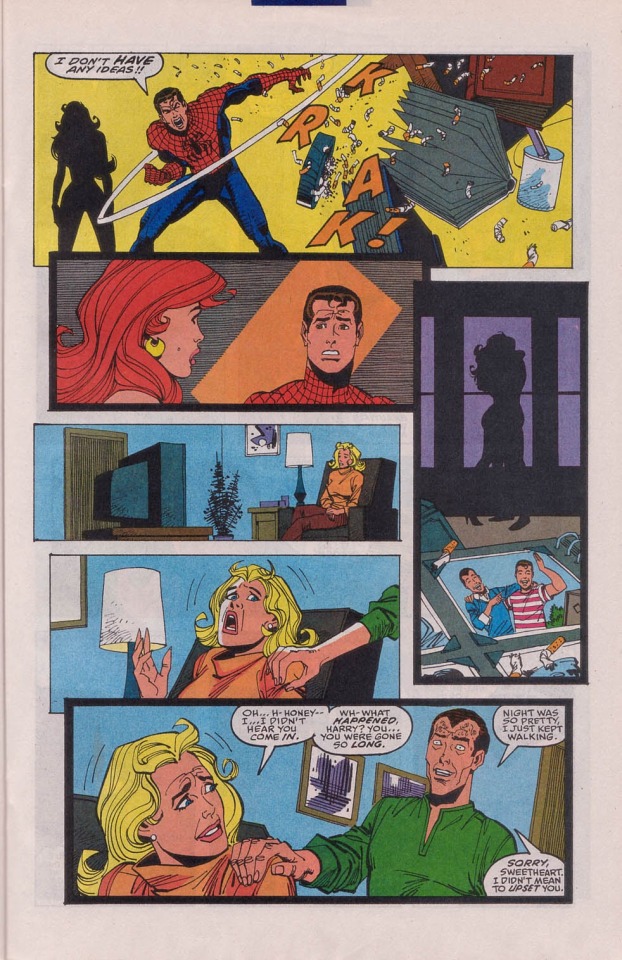
Noticeably here Peter isn’t insulting MJ all that much if at all. The context here is somewhat similar to ASm #700’s because he’s afraid Harry as the Green Goblin will target his loved ones.
However, Peter’s stress here is the result of weeks of psychological warfare on Harry’s part. He sent Aunt May an intimidating present back in Spec #189 and ordered the Rhino to threaten the Parkers in Spec #190. He admits to this strategy in Spec #200
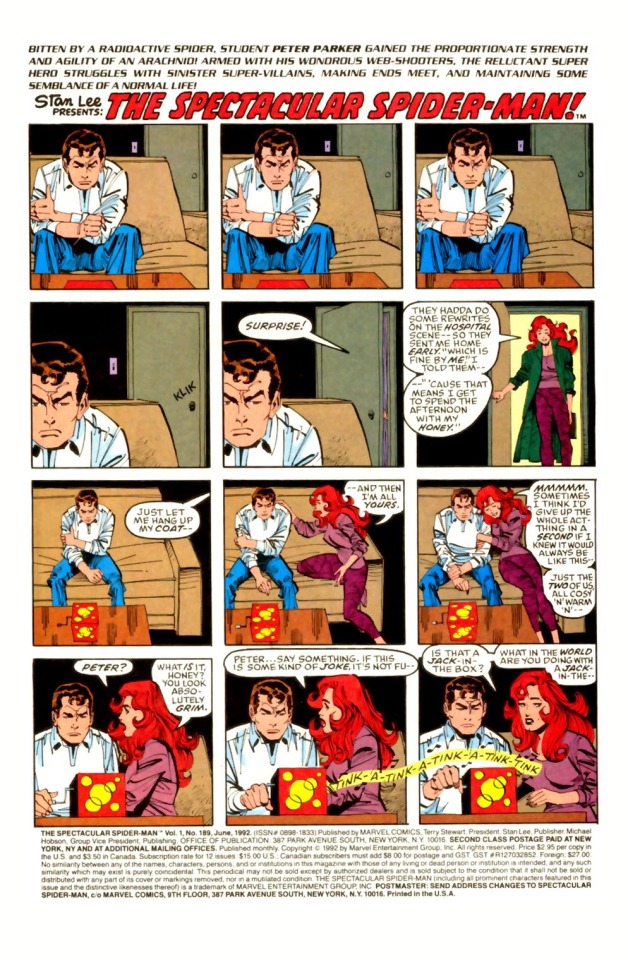
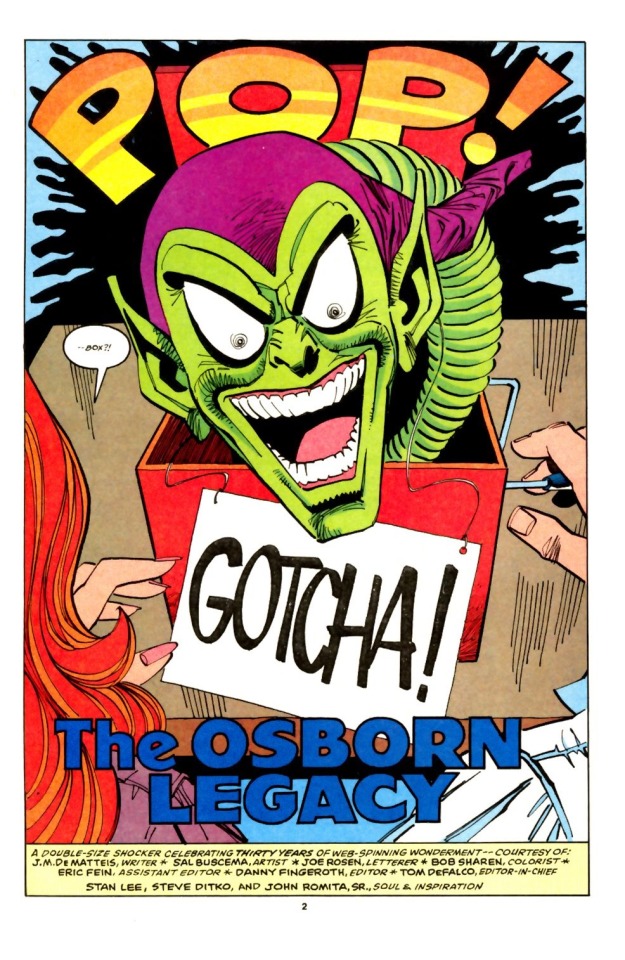
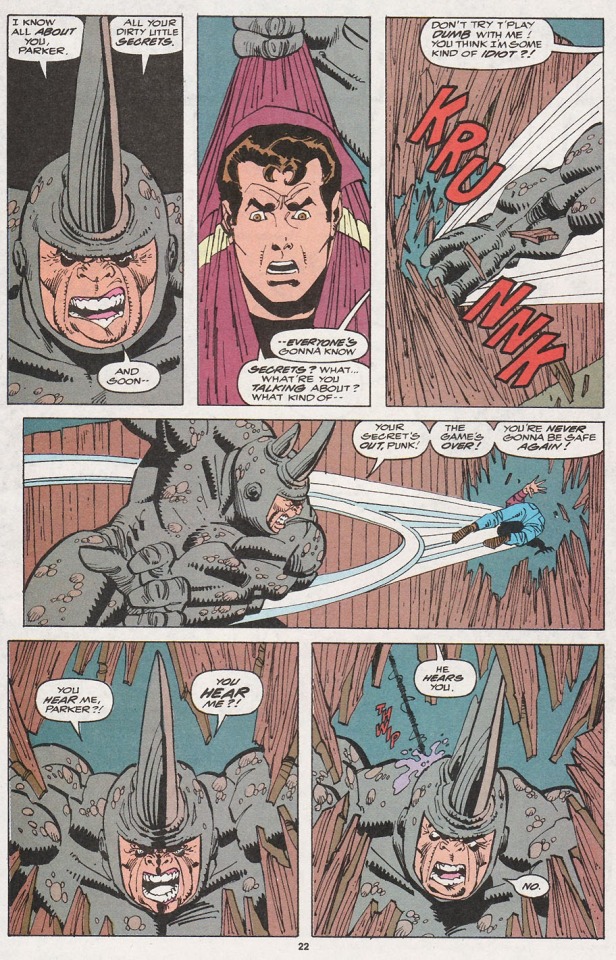
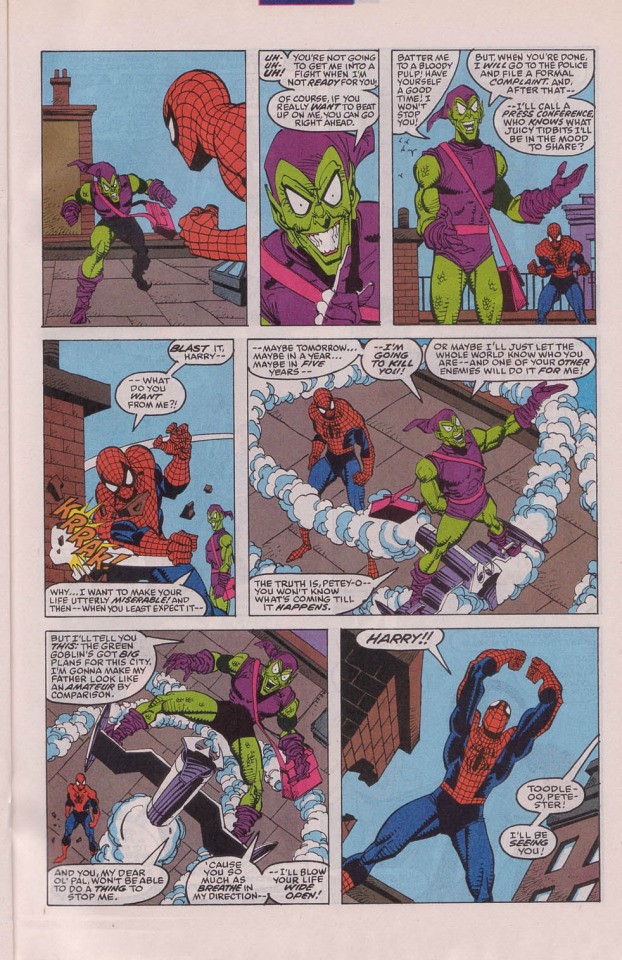
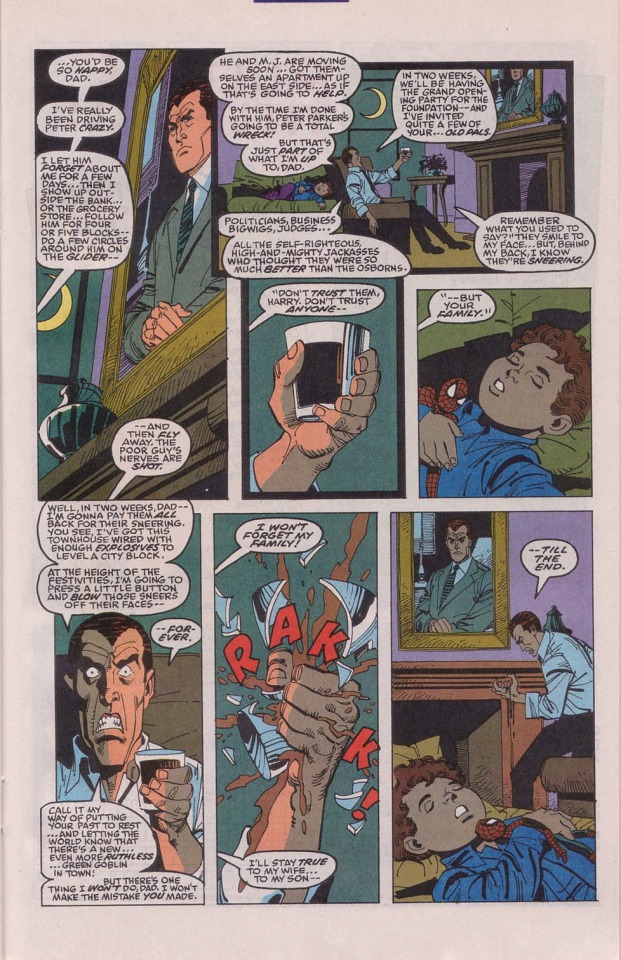
There had also been lots of other mentally taxing things going on around that time too, like Peter’s first encounter with Carnage, Venom’s renewed vendetta against him and Calypso using voodoo magic to torture him.
This was a Spider-Man who hadn’t just snapped into stress mode because of this one situation but had his mental resiliency pushed very far already.
Let’s also consider this wasn’t just some super villains targeting his loved ones, but an Osborn as the Green Goblin doing it. The Goblin/Norman Osborn hurt Peter in the most devastating way since his uncle died. For him to know his secret identity and to be using it to hurt Peter’s loved ones is going to hit harder than just any villains in general doing that.
MJ would know that not just because of her shared life experiences with Peter but because she studied goddam psychology!
The last time I can recall Peter being this scathing towards MJ was in Spec #211. Here he delivers perhaps an even more vicious insult to MJ than in ASM #122. He accuses MJ of knowing nothing about pain or sacrifice, merely running away from her pain.. He then equally scathingly suggests she go out dancing as she is want to do when she flees her concerns.
What makes these insults extra vicious is that they weren’t said by a younger Peter who’d never been with MJ seriously before. A Peter who didn’t know of her painful past. It was uttered by an older and married Peter who was fully aware of his wife’s childhood.
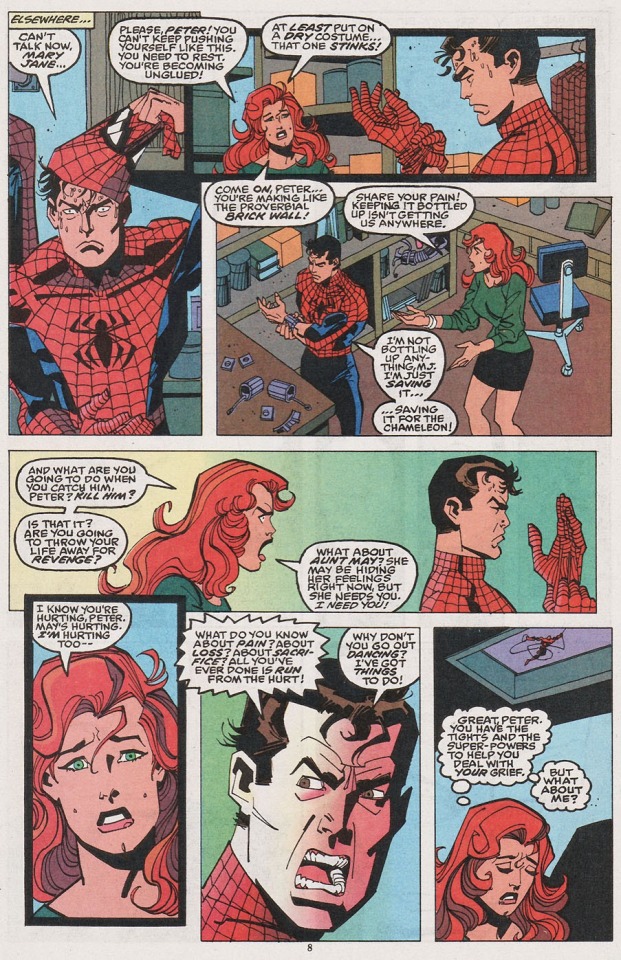
Again though, context is key.
This was set during the ‘Pursuit’ story arc. Months prior Peter had discovered his parents were alive and had been in a Soviet prison until the (then recent) collapse of the Soviet Union. Over time he’d accepted them back into his life and even revealed his secret to them. However, they were merely artificial imposters created to resemble his parents by the Chameleon. After they were destroyed Peter vowed to make Chammy pay and relentlessly went on the hunt for him.
So this moment from Spec #211 is yet another time Peter is grieving from a very fresh and very emotionally devastating wound. To lose your parents once is awful. To do it at a young age worse. To spend your whole life accepting that difficult. To find out all that grief and struggle was pointless because your parents were alive and abruptly back in your life? Well that’s emotionally confusing at best, if not a major gut punch at worst. To then put the work in to build a relationship with them, to learn to trust them, to let them in and open up about your most intimate secret? That’s a big step. That would’ve taken immense emotional strength to make yourself so vulnerable.
To then be betrayed after that, by your parents no less, to discover it’s all been a sham. That the work you put in was a cruel joke and to then lose your parents all over again.
It’s an emotional/mental scar the likes of which many people might never have recovered from.
Peter is not simply angry. He is incensed! He is very close to being in a murderous rage.
Is it any wonder he lashes out so cruelly and so unfairly against MJ in this moment?
Of course not. He’s not in the right but obviously it’s forgivable given the circumstances.
Again though, his stress is born from grief and pain. No fear or concern.
So as we can see, past precedent shoots down the idea that Peter would talk to MJ this way even if he was stressed and so on. And MJ knows that.
Shit, he didn’t talk to MJ this way during ‘Civil War’ when the Parker family were fugitives and Peter’s identity was public knowledge. There, as stressed and concerned as he was, he was often soft spoken and even romantic with MJ.
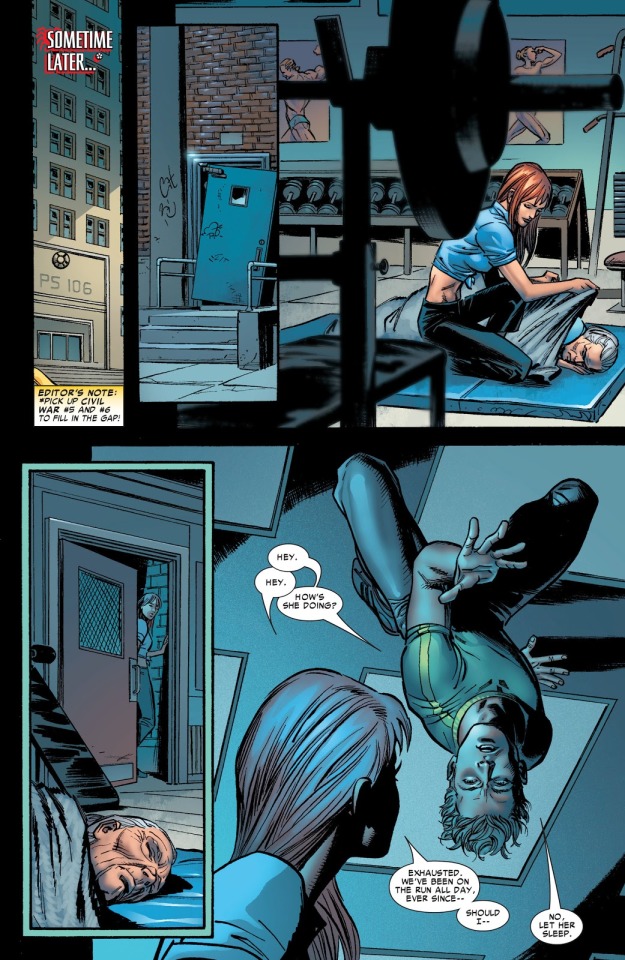
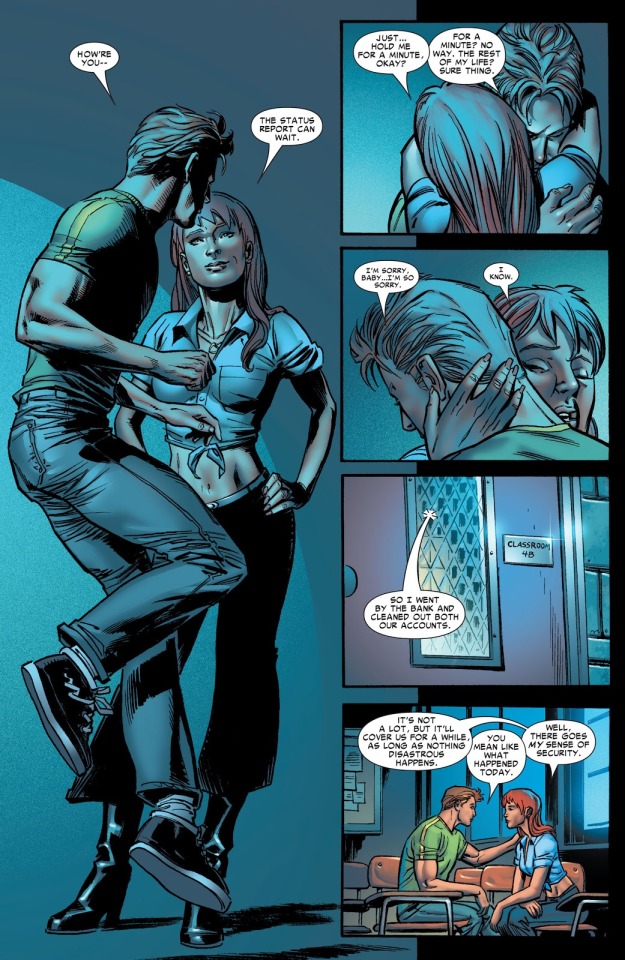
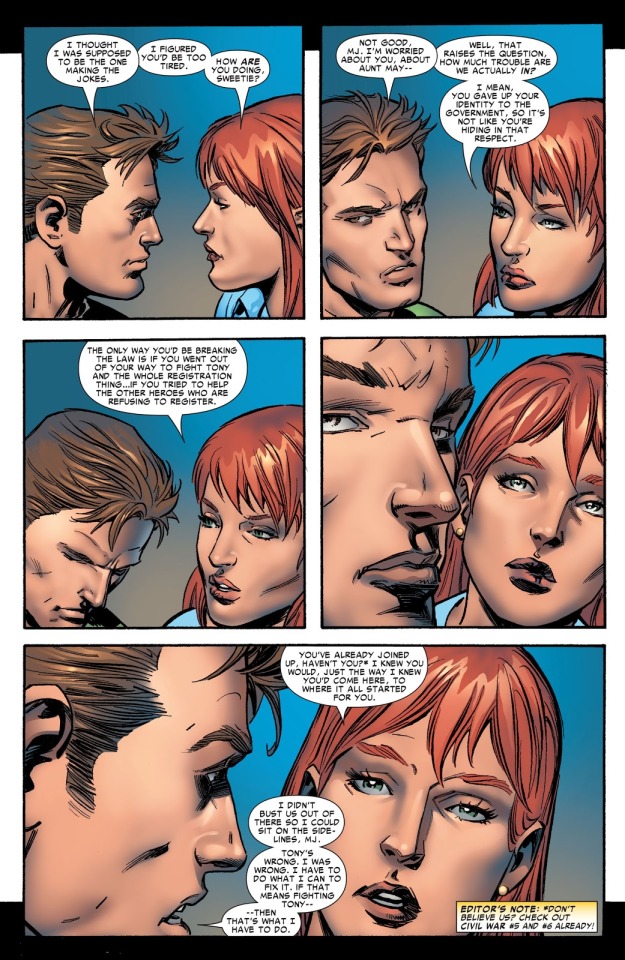
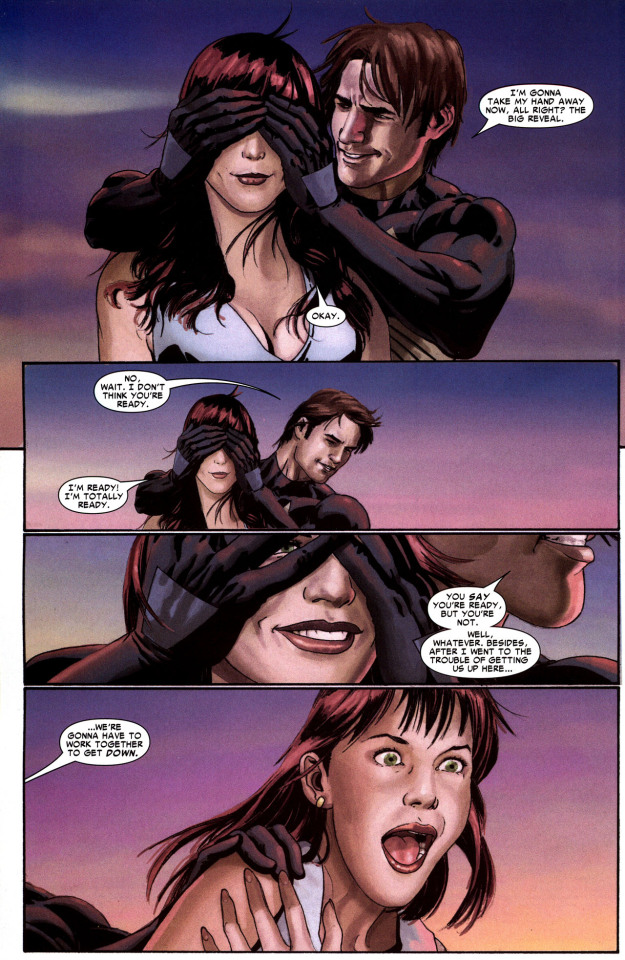
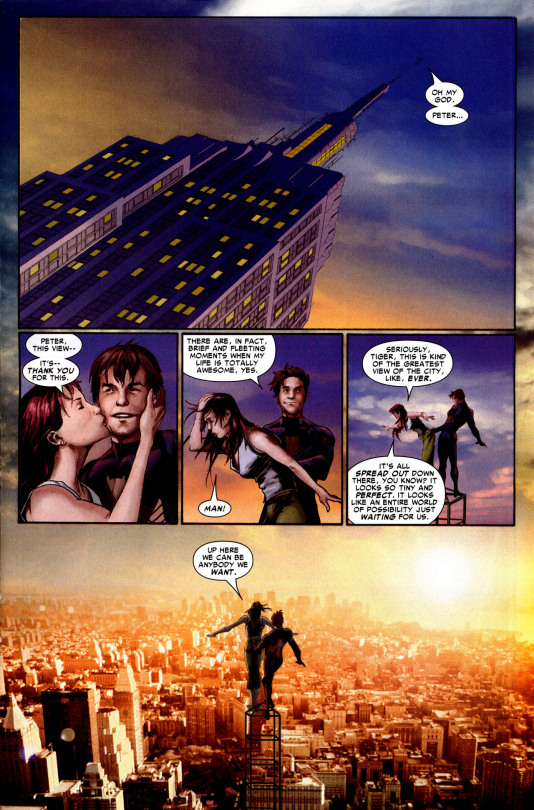
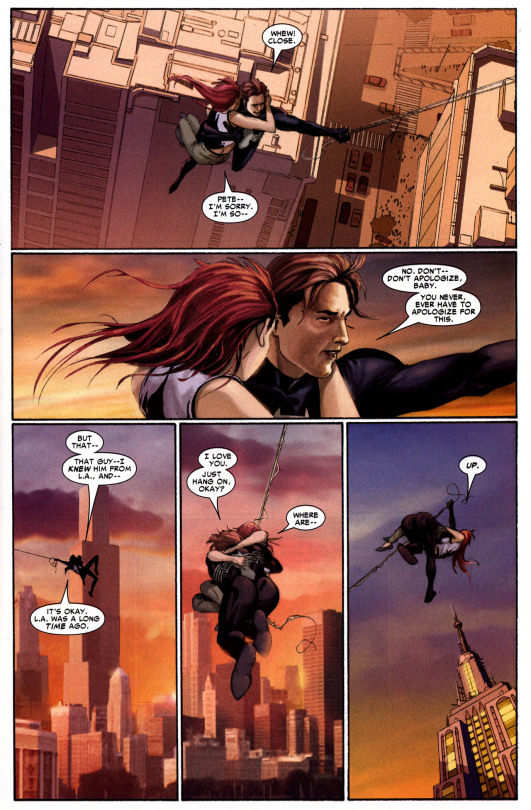

Not to mention what on Earth is there to even be fearful or stressed about?
MJ’s dialogue claims Peter is scared, worried for his loved ones. Concerned that he’s not up to the challenge of protecting them.
But like…it’s Trapster, Scorpion, Hydro-Man and a dying Doc Ock.
Not exactly the A-Team are they?
Trapster is a loser C-lister Peter 9/10 can very easily handle and has handled in the past.
Hydro-Man is technically more powerful but you zap him with some electricity and he’s out. He’s really not that difficult to defeat even for a low tech Spider-Man, let alone a Spidey with access to advanced tech and assistance from HORIZON labs scientists.
Scorpion is in some ways the most deadly of these three but he’s also way easier to beat. You don’t have to worry about his malleable body or his sticky traps. He’s basically all about brute force and Spider-Man was able to clean his clock even as an inexperienced teenager.
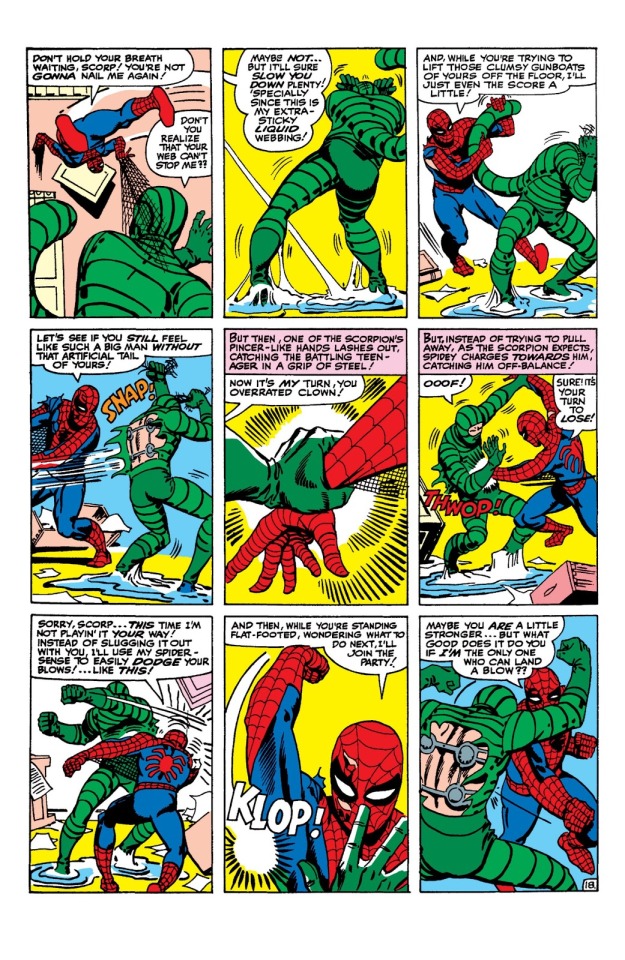
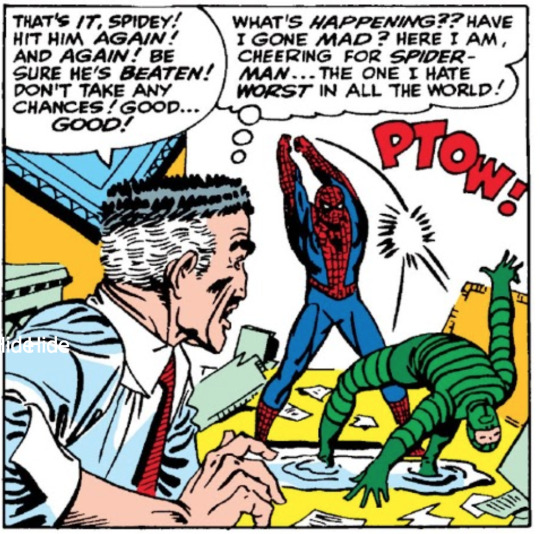
And when he wasn’t holding back as an adult it was really no contest.
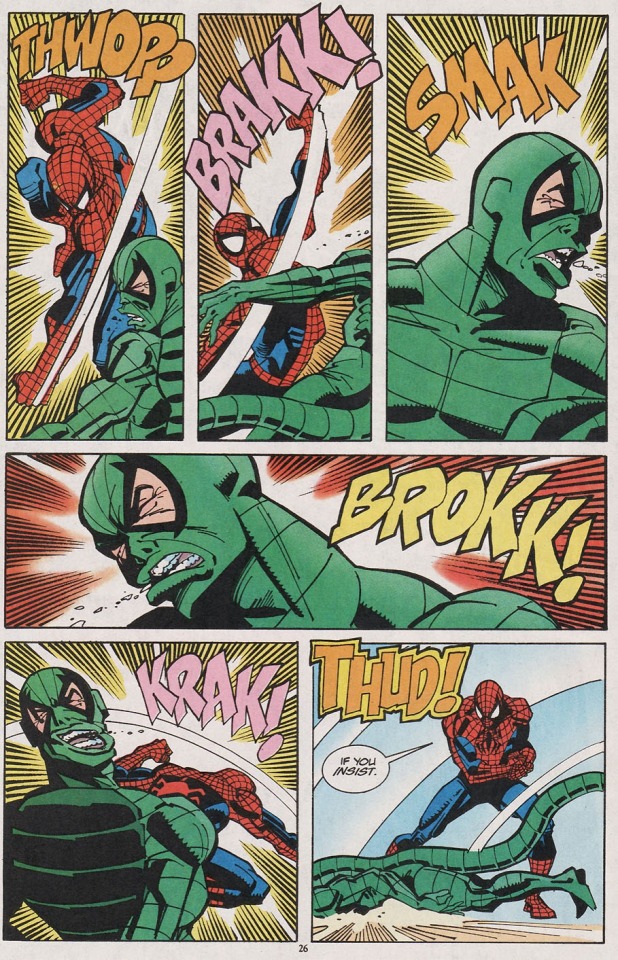
Normally Doc Ock would be the most formidable opponent here but he’s literally hours away from dying. This a very far cry from the Doc Ock who was powerful enough to manhandle teen Spidey in ASM #3
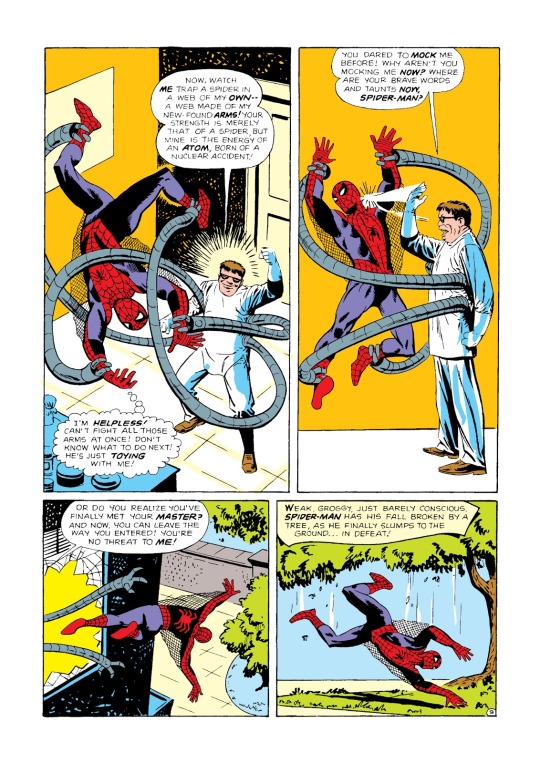
Or who outright intimidated Spidey when he was like 23 years old.
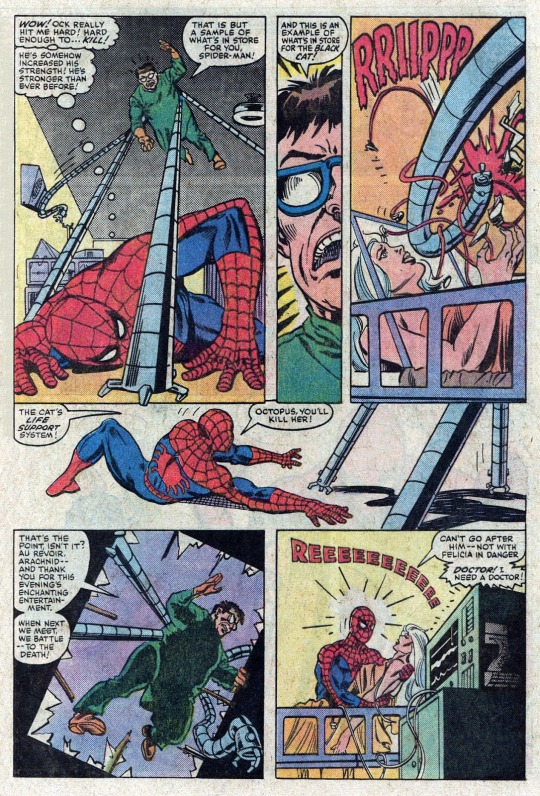

Spidey routinely beat Ock when he wasn’t backed up by gadgetry and HORIZON labs. Now he has AND he’s got time to prepare himself for battle AND Otto is on his last legs. As far as Ock battles go, this is an unfair fight. The cards are in Spider-Man’s favour.
Yes they are ganging up on him but Spider-Man actually fares better against groups of opponents because of his acrobatic abilities and spider sense. He is actually able to turn his opponents against one another if anything.
Again, MJ knows all this.
I’m not saying this situation wouldn’t be cause for concern but it wouldn’t be emotionally destabilizing Peter to nearly the same extent as many of the instances I spoke of above.
So MJ would be absolutely aware that Peter is acting very out of the ordinary here.
So the guy who claimed the situation justifies her blindness is full of shit.
P.S. Also, frankly MJ looks weak for saying she loves Peter after he chews her out.
#Spider-Man#Superior Spider-Man#mjwatsonedit#mary jane watson#Mary Jane Watson Parker#MJ Watson#Peter Parker#otto octavius#Doc Ock#Doctor Octopus#clone saga#Dan Slott
35 notes
·
View notes
Text
Why criticizing Peter Parker for not having life insurance makes YOU look stupid: A mini-essay
For years now I’ve heard the critique of Peter Parker’s character that he’s an irresponsible man-child fuck up because he doesn’t have life insurance.
Here is why that criticism isn’t only invalid but why saying it doesn’t make you smart, but rather reveals how idiotic you are.
The criticism stems from two specific sources. The first source is from an offhand comment in the 2005 storyline the Other, specifically Friendly Nieghborhood Spider-Man #2. To give some context Peter Parker has been diagnosed with a terminal illness and after consulting the big brains of the Marvel Universe (Reed Richards, Hank Pym, T’Challa, Bruce Banner, Tony Stark, etc) is accepting the fact that he’s doomed.
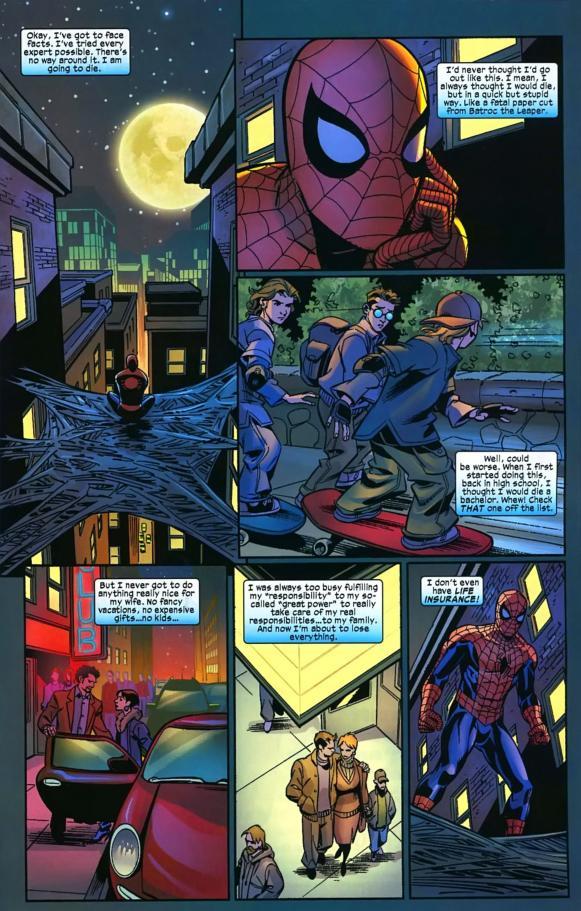
The other source for this criticism stems from famous internet reviewer Linkara’s review of One More Day on his long running internet review show Atop the Fourth Wall.
youtube
I’ve dissected Linkara’s over all criticism of the character before and explained why it’s utter cack that is evidence of his ignorance when it comes to the character (not unexpected given that he’s hardcore DC and doesn’t dabble half as much into Marvel).
But that isn’t my point or the topic of discussion.
So first of all let’s just do some important context here for both sources.
The line about Peter not having life insurance came from Reginald Hudlin who frankly was never good as a Spider-Man writer, was given Marvel writing jobs as a weird publicity stunt more than anything and was the guy who wrote Tony Stark so out of character that he was literally offering Spider-Man the opportunity to commit adultery on Mary Jane at one point.
Hardly the most liable source for the character is it?
But in truth most people probably know more about this criticism from Linklara’s video. Linkara is very well known within the comic book industry as he is the closest thing to a full on comic book nerd celebrity we have. Allegedly his videos actually inspired Marvel to make a Deadpool storyline which revived incredibly obscure characters that were the subject of one of his reviews.
Typically whenever the criticism of Peter not having life insurance is brought up it’s in a manner not dissimilar to Linkara’s long and ill informed rant about Peter as a character.
Which heavily indicates to me that really most of the people bringing up the criticism are parroting him without
a) Having read the story
b) Having read much Spider-Man
c) Considering the context of the character and the world he lives in and the life he leads.
In short they repeat the criticism to pretend they know what they are talking about when they do not.
But okay let’s get down to brass tax and explain why it makes complete fucking sense despite all that as to why Peter Parker wouldn’t have life insurance.
The short story is it boils down to three reasons
· He can’t afford it
· It’d be unethical
· It’d be redundant
Lets go through those one by one.
He can’t afford life insurance
In the storyline in question Peter Parker had been living rent free with the Avengers for at most 2 months tops and that’s an extreme estimate, it’s probably less.
So what was Peter’s living situation BEFORE that?
He was a teacher at an underfunded, under resourced inner city school with a history of crime and poverty in the area where some of the students were effectively squatting and there was also drug problems too. His decision to teach there was more out of a desire to help the children rather than any financial considerations. Due to being Spider-Man days off also were not uncommon for him and one imagines that would impact his pay. Teachers tend to get a shitty wage in general but a teacher at this sort of school under these sorts of conditions would be a noticeably shitty wage. So Peter Parker doesn’t have much income coming generally speaking.
Then you’ve got his expenses.
Living in central Manhattan is extortionately pricy most of the time due to the rent alone, never mind other utilities, food, clothing and other necessities.
But Peter ALSO had to use some of his salary to help support Aunt May who as far as we know never had a job where there would be a pension scheme. Maybe she had some money to get by but given that Peter as a teenager was obviously the main source of income through being a photographer it’s likely May never had much money so was reliant upon Peter for financial support. This is a big deal because she is not only an older person living in what looks like a two bedroom (at least) detached house in Forest Hills she also has a history of medical problems which have proven pricy over the years.
On top of all of that Peter also has to pay for maintenance of his equipment as Spider-Man. He has to get the right fabric to make multiple copies of his full body costume (comprised of seven different items of clothing, a mask, a shirt, pants, gloves and boots). He has to get special one way lenses the then must attach to the fabric of his costume (which would probably require some kind of adhesive). He has to make, maintain and ensure he has spares of his web shooters and web cartridges which is an entirely custom made set of devices meaning he’d have to purchase the individual materials himself. He has to do the same for his spider tracers, his spider signal and his utility belt which contains the latter devices and his cartridges.
And then there is the web-fluid. This is an entirely custom made chemical substance which is not only not sold in stores but requires Peter to be conspicuous when purchasing the individual ingredients so as to avoid suspicion. He also needs to maintain workable chemistry apparatus in order to properly mix the web fluid formula correctly, which is unto itself not cheap. Whilst it’s possible for him to make a cheaper version as Ben Reilly did in Sensational Spider-Man #0, Ben discovered that his cheaper version of the formula wasn’t nearly as reliable.
When taken with Peter’s outright statements that the web fluid is expensive you see that it’s yet another notable yet necessary draw on his income.
Now bear in mind that for most of his career Spider-Man did not have a reliable regular salary and relied upon freelance photography which makes his income flexible at best.
Do you see now?
He probably couldn’t AFFORD life insurance in the face of all the more immediate pressing needs he needed money for.
Now sure during the times he was in a relationship with Mary Jane, you could say he could have gotten life insurance when she was bringing in the big bucks but Mary Jane’s career has not itself been reliable. She’s had only short bursts of success and in a very recent story (Marvel Knights: Spider-Man #5) prior to Friendly Neighborhood Spider-Man #2 she’d gotten the family into some notable financial straits.
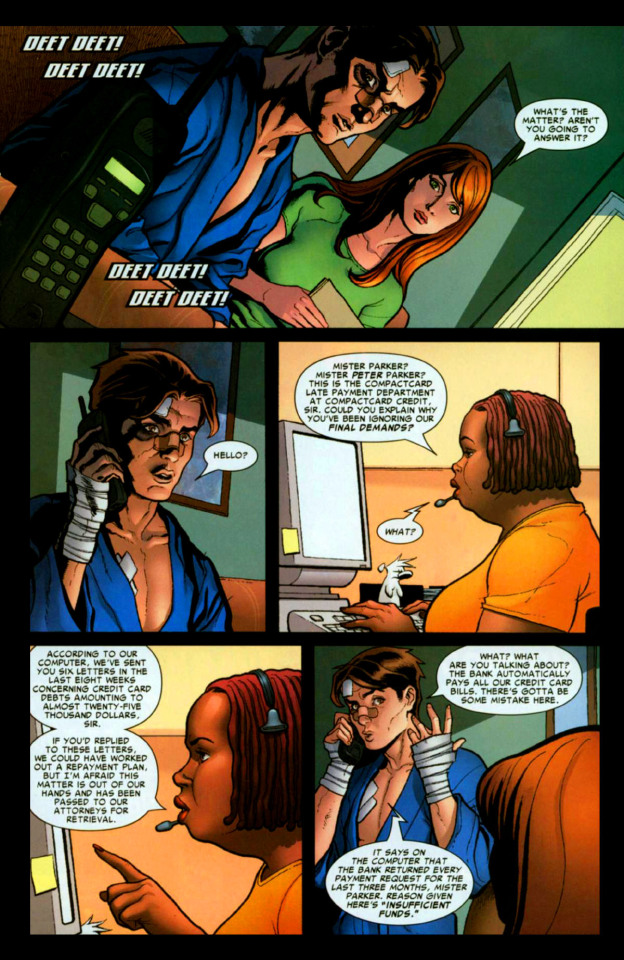
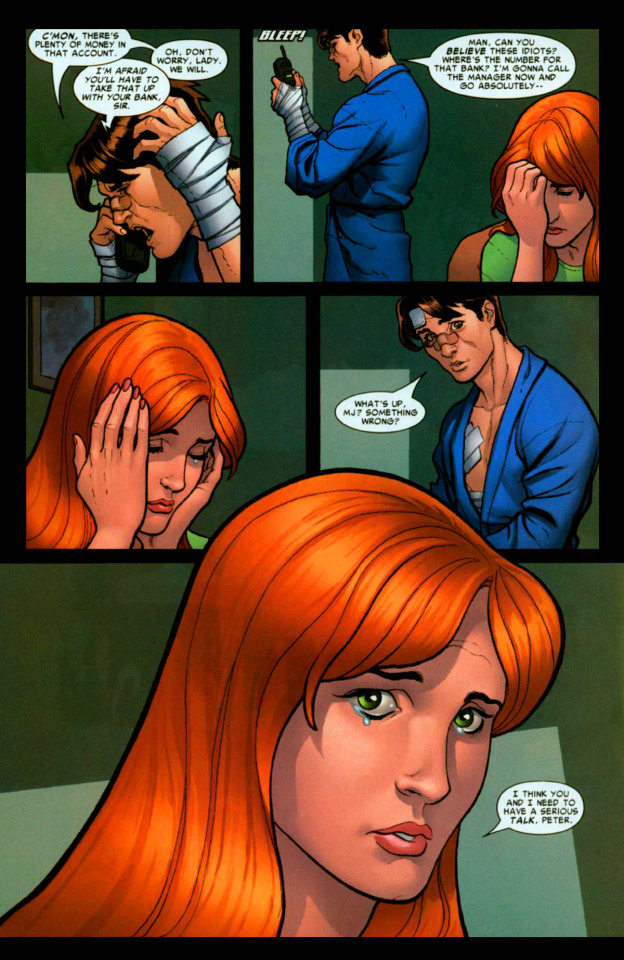
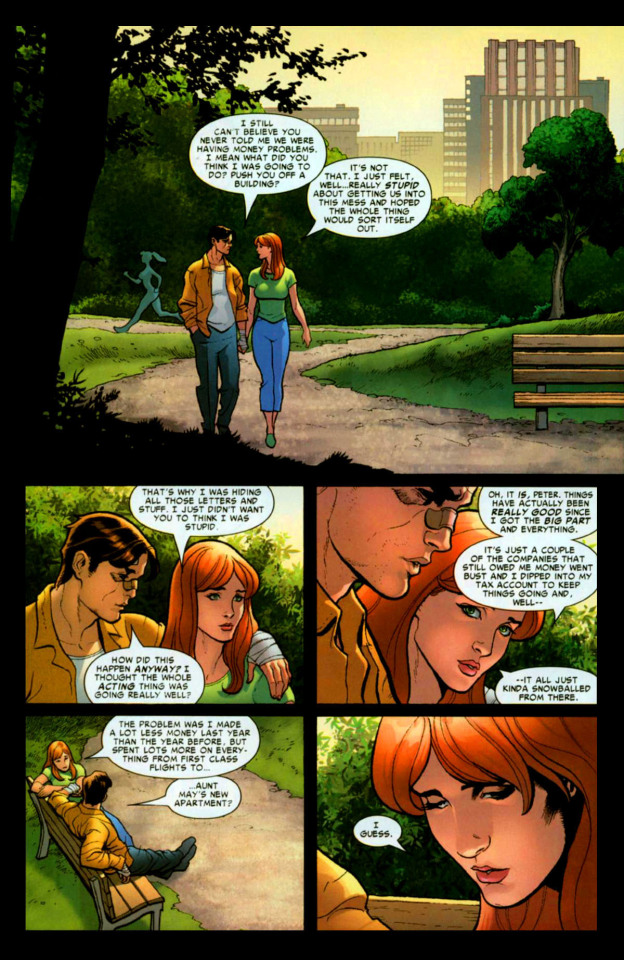
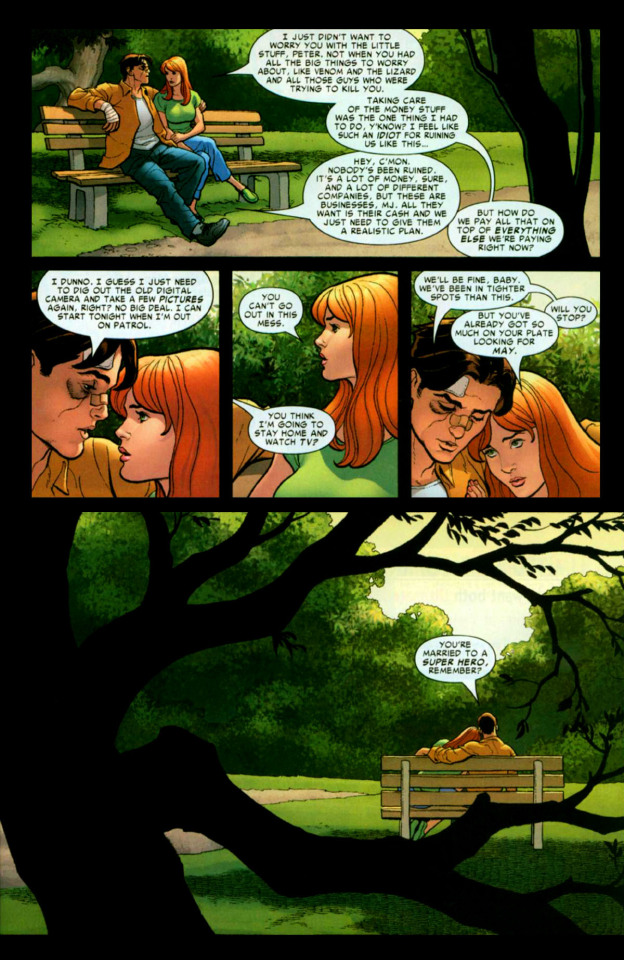
It’d be redundant for him to get life insurance
In the Other storyline Peter Parker is dying due to his own superhuman biology. I forget the specifics but it’s essentially something to do with the radiation in his system breaking his body down or something like that.
Why do I bring this up?
Because unless somebody wants to correct me if I am wrong you can’t just get life insurance wherein your family gets money if you die under any given circumstances.
The circumstances of your death have to be taken into account before the company pays out.
In this story Peter is foolishly berating himself for not insuring his life against dying of an entirely fictional Marvel Universe illness which is entirely exclusive to him because nobody else has ever been bitten by a radioactive spider ever and the cause of death would be incredibly obvious to anybody looking at the medical report.
So he literally could never have BEEN insured against this in the first place.
But this ties into a broader point, that being that the life Spider-Man leads renders the need for life insurance completely redundant.
I’m not sure if any of the ‘enlightened people’ like Linkara (who once defended Joel Schumacher’s use of a Bat credit card in the 1997 film Batman and Robin) noticed but...Peter Parker is a superhero.
Peter Parker lives a life wherein he risks his life on a daily basis and where his villains risk killing him at any given moment of any given day. Guys like Norman Osborn and Venom who know his secret identity and can bypass his Spider Sense can even kill him as he sleeps.
In the real world there is NO life insurance coverage for superhuman activites. Now sure we could say there is if you live in the Marvel universe...but not if you actually ARE a superhero.
Superheroes like Spider-Man are vigilantes who routinely bend the law and are involved in numerous acts of collateral damage. Even if a life insurance company was willing to look passed the lack of identification Spidey, Daredevil and other such heroes would present they’d never go ahead with insuring them nor would they be allowed legally speaking.
Between his enhanced biology which allows him to heal better, resist injury better, move fast enough to dodge bullets and know when danger might strike even in his sleep, Peter Parker himself is more or less iron clad guaranteed to never ever die from like a car accident or anything. He even instinctively avoided being hit by a car mere minutes after obtaining his powers as a teenager.
In fact his death is most likely to come from his activities as a superhero. It’s statistically all but guaranteed that if he was to die before retirement it’d be because of that. Which again is something it’d be impossible for him to insure his life for.
At the same time even if somehow he did die in a mundane normal way he could’ve gotten insurance for and could somehow fake the autopsy to cover up his superhuman biology and protect his identity the only people he’d want to provide for would be Aunt May and Mary Jane.
If Peter is single he’d want to provide for Aunt May but if he is single then like I outlined above he probably couldn’t afford life insurance anyway. More than this between her poor health, history of heart problems and the sheer shock and grief from losing her beloved son Aunt May wouldn’t be long for this world anyway. My family have friends who recently lost their 23 year old son and we are currently worried for the health of the boy’s parents because losing your child is just about the most devastating thing that can ever possibly happen to anyone, and when it happens when you are at an advanced age it can be incredibly dangerous.
But now consider if Peter did die whilst married to Mary Jane then providing for May wouldn’t be a problem, he’d know MJ could handle that as well as provide for herself. She had more than enough options for modelling work if push came to shove which would be able to keep them both well provided for. MJ also had extended family and close friends Peter could rely upon to look after them both. In fact since he was living with the Avengers at the time of FN Spider-Man #2 he could pretty much rest assured that they (including billionaire Tony Stark) would make sure they would be alright for money.
Sure upon living with the Avengers and having most of his financial concerns addressed Peter could have purchased some life insurance for any mundane forms of death he might’ve experienced but by the time of the Other he hadn’t been living there for very long and there had been more than a few serious issues which demanded his attention such as HYDRA launching a goddam missile and Mary Jane being harassed by the paparazzi. Shortly AFTER the Other storyline Peter was busy just appreciating the fact that he wasn’t dying anymore but it was like less than a month before the Super Human Registration Act was passed and things went to chaos as the Marvel Universe was engulfed in the stupid Civil War event.
Finally given that Spider-Man’s death was more than likely going to be the result of his hero activities it would mean there was a massive chance that in dying his identity could be compromised and thereby endanger his family and friends which would render life insurance the least of their concerns.
It would be unethical for Spider-Man to get life insurance
Let’s pretend for a second that life insurance really did work the way many of these critics seem to think it works.
That you buy life insurance and thereby your next of kin gets money whenever you die, regardless of the circumstances.
Well if Spider-Man did that in the knowledge that his death was all too possible given his life style it would be profoundly unethical and immoral of him to do so.
In fact it would be outright illegal because it would involve him withholding vital pieces of information about himself which would affect a company’s desire to insure his life and the amount of money they would be willing to pay out. This is because he is a high risk customer, he risks death every second of every day meaning a company might not only have to pay out at the drop of a hate even though he’s only 30 years old but if they think he’s just a normal guy they might have to pay out a lot of money.
If his identity was exposed the companies would never pay out citing the fact that he outright deceived them and if they did then Spider-Man just basically stole money from these people which is profoundly irresponsible and out of character for him.
All the above coalesces into two essential facts.
That it is actually entirely logical that Spider-Man doesn’t have life insurance.
And that the people reprimanding the character for not having life insurance are effing idiots.
#Linkara#atop the fourth wall#atop the 4th wall#Spider-Man#Peter Parker#reginald hudlin#Aunt May#May Parker#MJ Watson#mjwatsonedit#jane w#mary jane watson#Venom#Norman Osborn#Avengers#Tony Stark#Iron Man#Black Panther#T'Challa#Bruce Banner#hulk#Hank Pym#Yellowjacket#Reed Richards#mister fantastic#Batman#batman and robin#joel schumacher
37 notes
·
View notes
Text
This slideshow requires JavaScript.
Batman #27
One man finds himself caught between the forces of the War of the Jokes and Riddles like a kite in a hurricane, being pushed and pulled between Joker, Riddler, and Batman; and his family’s safety hanging in the balance.
There’s been one character that’s popped up randomly but reliably since King started his run on Batman, and he finally gets an issue (at least one issue) all to himself. Ironically, King is using his focus on this character to give us a ground level perspective on the war, what it’s like to be a small time criminal with some notable skills in the middle of one of the most tumultuous times in Gotham’s history. It’s not only the opportunity to give pathos to someone who’s been a joke up until now, but in that pathos, we better understand the toll this war pays on even the D-listers of the city. And, of course, King handles it with the same poetry he’s handled the rest of the series, showing us the seeds of a flower that’s already bloomed.
Superman #27
It’s time for a Kent family vacation, and for the Independence Day (this comic is a wee bit late), they’re going on a tour of American memorials, with Clark and Lois teaching Jon about the history that makes them worth the trip.
I’m a fan of hokey and schmaltzy, but patriotic schmaltz is where I draw the line. After all, there’s history and there’s hierography, and it’s hard for me to tolerate any account of, for example, the founders, without bringing up their hypocrisies of slave ownership and genocide. Plus, there’s the general glorification of war that happens whenever you do this type of thing that sours even sweet scenes like the Kents treating a hopeless vet to dinner and standing up for his right to dine somewhere even if he may “disturb other customers.”
Superman is meant, in part, to represent the best of American ideals, and unfortunately, this comic doesn’t really touch those.
Green Arrow #27
Here, however, is a comic that discusses America in a way I can get behind.
Green Arrow’s search for the Ninth Circle takes him to Washington DC, where he runs into Wonder Woman, and the two foil a plot to increase America’s support of war, and thus military spending.
Green Arrow doesn’t even try for subtlety here, at times reading like a polemic against America’s hawkishness – which is incredible. Oliver waxes on about how the Ninth Circle uses fear to motivate people to their side by convincing the public that the only way to feel safe is to buy more and more weapons to protect them from an increasingly dangerous threat – a threat they engineer, of course. He even lectures about himself and his own ignorance of his privilege when he first began as the Green Arrow.
But what’s so effective is that, despite how over the top things get in this comic, the results are all too familiar. A formally pro-peace senator being scared into supporting increased “defense.” Despite saving the day, Oliver and the comic believe that, regardless of political affiliation, all politicians are motivated by fear and eventually learn to support endless war for the sake of feeling secure. It’s all lies acted on for the sake of profit.
The Wild Storm #6
We’re 25% through this story, which, in Ellis time, means that it’s finally appropriate time for an infodump.
After an expertly scripted and executed fight scene, that reads like John Wick fighting Jaws from 007, between Cray and the two-person kill-squad sent to kill him ends with Cray accepting Christine Trelane’s job offer – Adrianna brings Spica to Jake Marlowe’s base in Brooklyn so she (and we) can get some questions answered about IO, Skywatch, and how this world is run.
The way the comic is put together, the fight in the beginning feels like having your dessert before your dinner; quenching our action-tooth before giving us some nourishing exposition. But I don’t want to give the impression that this is dry exposition. Ellis still writes some of the sharpest dialogue in comics (and TV and film), and Davis-Hunt still finds ways to make two people talking at a table graphically disturbing when certain reveals make it appropriate. Between this and Clean Room, he’s become my favorite comic artist for scenes of the grotesque and Giger-esque.
Secret Empire #6
While lost-Steve continues to be tortured by the Red Skull, and the heroes trapped in the Darkforce dimension do their best to keep Tandy’s light; Hydra unleashes a full-on assault on the resistance base. And inside their crumbling base, the resistance tears themselves apart trying to find their mole.
This issue is all over the place, not giving any of its developments any time to breathe. I’m not sure if this issue is supposed to end on a high-point or low-point, and I doubt that’s intentional. Through the issue is a narration that starts with Steve talking about how all heroes are hypocrites who fight only for their own pride and reputation, then goes to Hawkeye during the attack on the Mount where he seems to admit defeat before being reminded of why heroes really fight. And there’s a dramatic showdown between Steve and Tony that intentionally echoes the first Civil War. Hydra unleashes the Hulk on the resistance in what feels like it’s supposed to be the story’s lowest point, but this is right about the point in the story where Hawkeye’s narration tells us that this is where all the heroes regain their nerve…and then there’s a nuke and we’re supposed to believe everyone died even though we saw them all escape…?
Again, nothing has room to actually land and breathe before the issue hits us over the head with the next dramatic moment. While I’m normally against extending these events at all – and this one is already set to be 10 issues – this issue could’ve easily been split into two that allow for a better dramatic arc to unfold over the course of this one battle.
Peter Parker: The Spectacular Spider-Man #2
After a brief misunderstanding with Ironheart, who eventually agrees to help Peter with the hacked Stark phone, Pete heads back to New York to summarize Amazing Spider-Man: Family Business to a confused Johnny Storm, and then go on his date with Rebecca…in full costume.
Like Zdarksy’s other books with Marvel, this one slows down and takes us more towards the ground-level with its characters, putting more focus on their day-to-day rather than whatever big criminal plot they’re gonna have to face. We spend a lot more time with Peter in his apartment chatting with Teresa and Johnny, or out on his date than we do following up on the hacked phone.
And Zdarksy writes the most natural sounding Peter dialogue in any Spider-Man comic today. Where Bendis’ writing can often feel like the characters are reading from a script, and many of Slott’s quips feel (appropriately) forced; Zdarsky’s Peter reads like someone legitimately saying the first funny thing that pops into his head, and is appropriately hit-and-miss. That feeling is also aided by the more normal situations that Peter’s found himself in this issue; as he’s quipping during a date, not while fighting supervillains.
I think, more than not mentioning his current status quo as a billionaire, the reason that this series feels like a return to form is because it’s focusing a lot more on Peter than Spider-Man.
Ms. Marvel #20
In this issue’s opening pages, Ms. Marvel establishes itself as the ideal of “the world outside your window” that all Marvel comics that choose to attempt that should strive towards. Aamir, who was arrested for no reason last issue, pleads his case explaining his innocence, and even explains who the authorities should look for if they want to find terrorists that look like him. It’s an eloquent and grounded explanation of who gets radicalized and why, delivered by a character in a situation that reflects our unfortunate reality. It’s a clear-headed and powerful scene, and more comics should strive for such relevancy.
Then, Ms. Marvel wakes up from being knocked-out last issue, and jumping back into action, finds herself in the middle of a Chuck Worthy rally. Worthy’s speech is reflective of the sort of conservative rhetoric of law and order and nostalgia that unfortunately wins elections; but presents it in a way that doesn’t necessarily hit you over the head with it, like a comic like Green Arrow would.
This arc – and this series overall – successfully puts it’s hero against clear analogues for real world issues, and makes them approachable and resonant. Yeah, you’re getting a story about a stretchy girl that punches bad robots, but Ms. Marvel has also told stories about gentrification, online-harassment, and islamophobia that confront each issue with the same tenacity that Kamala confronts her villains.
Bitch Planet: Triple Feature #2
And where Ms. Marvel tackles real world issues with a degree of allegory, Bitch Planet has always come at it from the angle of parody – ramping up the real world effects of white patriarchy to what are supposed to be ridiculous extremities. Like the last triple feature, this issue takes us off the prison planet and to Earth itself, where life isn’t that much better for women.
The first story, Bits and Pieces, shows us a child’s beauty pageant in Bitch Planet, where tween girls are judged on the beauty of a single body part, and has one heck of a final page. The second, This is Good for You, shows us a propaganda film. And the third and longest story, What’s Love Got to do With it?, tells the story of one woman’s quest to get married before her family is forced to pay an “Old Maid tax,” and explores how dating is done on Bitch Planet.
All of these stories are generally funnier than the main series, each acting as a short parody of a single aspect of what living in an uber-patriarchy would be that rather than telling the sort of wide-ranging story of the main title. This means that each story is also sharper, with single page conclusions finding inventive ways to twist the knife like the best episodes of The Twilight Zone.
Comic Reviews for 7/19/17 Batman #27 One man finds himself caught between the forces of the War of the Jokes and Riddles like a kite in a hurricane, being pushed and pulled between Joker, Riddler, and Batman; and his family's safety hanging in the balance.
#batman#bitch planet#dc comics#green arrow#marvel#ms. marvel#peter parker#secret empire#spider-man#superman#triple feature#wild storm
0 notes
Text
This slideshow requires JavaScript.
Batman #27
One man finds himself caught between the forces of the War of the Jokes and Riddles like a kite in a hurricane, being pushed and pulled between Joker, Riddler, and Batman; and his family’s safety hanging in the balance.
There’s been one character that’s popped up randomly but reliably since King started his run on Batman, and he finally gets an issue (at least one issue) all to himself. Ironically, King is using his focus on this character to give us a ground level perspective on the war, what it’s like to be a small time criminal with some notable skills in the middle of one of the most tumultuous times in Gotham’s history. It’s not only the opportunity to give pathos to someone who’s been a joke up until now, but in that pathos, we better understand the toll this war pays on even the D-listers of the city. And, of course, King handles it with the same poetry he’s handled the rest of the series, showing us the seeds of a flower that’s already bloomed.
Superman #27
It’s time for a Kent family vacation, and for the Independence Day (this comic is a wee bit late), they’re going on a tour of American memorials, with Clark and Lois teaching Jon about the history that makes them worth the trip.
I’m a fan of hokey and schmaltzy, but patriotic schmaltz is where I draw the line. After all, there’s history and there’s hierography, and it’s hard for me to tolerate any account of, for example, the founders, without bringing up their hypocrisies of slave ownership and genocide. Plus, there’s the general glorification of war that happens whenever you do this type of thing that sours even sweet scenes like the Kents treating a hopeless vet to dinner and standing up for his right to dine somewhere even if he may “disturb other customers.”
Superman is meant, in part, to represent the best of American ideals, and unfortunately, this comic doesn’t really touch those.
Green Arrow #27
Here, however, is a comic that discusses America in a way I can get behind.
Green Arrow’s search for the Ninth Circle takes him to Washington DC, where he runs into Wonder Woman, and the two foil a plot to increase America’s support of war, and thus military spending.
Green Arrow doesn’t even try for subtlety here, at times reading like a polemic against America’s hawkishness – which is incredible. Oliver waxes on about how the Ninth Circle uses fear to motivate people to their side by convincing the public that the only way to feel safe is to buy more and more weapons to protect them from an increasingly dangerous threat – a threat they engineer, of course. He even lectures about himself and his own ignorance of his privilege when he first began as the Green Arrow.
But what’s so effective is that, despite how over the top things get in this comic, the results are all too familiar. A formally pro-peace senator being scared into supporting increased “defense.” Despite saving the day, Oliver and the comic believe that, regardless of political affiliation, all politicians are motivated by fear and eventually learn to support endless war for the sake of feeling secure. It’s all lies acted on for the sake of profit.
The Wild Storm #6
We’re 25% through this story, which, in Ellis time, means that it’s finally appropriate time for an infodump.
After an expertly scripted and executed fight scene, that reads like John Wick fighting Jaws from 007, between Cray and the two-person kill-squad sent to kill him ends with Cray accepting Christine Trelane’s job offer – Adrianna brings Spica to Jake Marlowe’s base in Brooklyn so she (and we) can get some questions answered about IO, Skywatch, and how this world is run.
The way the comic is put together, the fight in the beginning feels like having your dessert before your dinner; quenching our action-tooth before giving us some nourishing exposition. But I don’t want to give the impression that this is dry exposition. Ellis still writes some of the sharpest dialogue in comics (and TV and film), and Davis-Hunt still finds ways to make two people talking at a table graphically disturbing when certain reveals make it appropriate. Between this and Clean Room, he’s become my favorite comic artist for scenes of the grotesque and Giger-esque.
Secret Empire #6
While lost-Steve continues to be tortured by the Red Skull, and the heroes trapped in the Darkforce dimension do their best to keep Tandy’s light; Hydra unleashes a full-on assault on the resistance base. And inside their crumbling base, the resistance tears themselves apart trying to find their mole.
This issue is all over the place, not giving any of its developments any time to breathe. I’m not sure if this issue is supposed to end on a high-point or low-point, and I doubt that’s intentional. Through the issue is a narration that starts with Steve talking about how all heroes are hypocrites who fight only for their own pride and reputation, then goes to Hawkeye during the attack on the Mount where he seems to admit defeat before being reminded of why heroes really fight. And there’s a dramatic showdown between Steve and Tony that intentionally echoes the first Civil War. Hydra unleashes the Hulk on the resistance in what feels like it’s supposed to be the story’s lowest point, but this is right about the point in the story where Hawkeye’s narration tells us that this is where all the heroes regain their nerve…and then there’s a nuke and we’re supposed to believe everyone died even though we saw them all escape…?
Again, nothing has room to actually land and breathe before the issue hits us over the head with the next dramatic moment. While I’m normally against extending these events at all – and this one is already set to be 10 issues – this issue could’ve easily been split into two that allow for a better dramatic arc to unfold over the course of this one battle.
Peter Parker: The Spectacular Spider-Man #2
After a brief misunderstanding with Ironheart, who eventually agrees to help Peter with the hacked Stark phone, Pete heads back to New York to summarize Amazing Spider-Man: Family Business to a confused Johnny Storm, and then go on his date with Rebecca…in full costume.
Like Zdarksy’s other books with Marvel, this one slows down and takes us more towards the ground-level with its characters, putting more focus on their day-to-day rather than whatever big criminal plot they’re gonna have to face. We spend a lot more time with Peter in his apartment chatting with Teresa and Johnny, or out on his date than we do following up on the hacked phone.
And Zdarksy writes the most natural sounding Peter dialogue in any Spider-Man comic today. Where Bendis’ writing can often feel like the characters are reading from a script, and many of Slott’s quips feel (appropriately) forced; Zdarsky’s Peter reads like someone legitimately saying the first funny thing that pops into his head, and is appropriately hit-and-miss. That feeling is also aided by the more normal situations that Peter’s found himself in this issue; as he’s quipping during a date, not while fighting supervillains.
I think, more than not mentioning his current status quo as a billionaire, the reason that this series feels like a return to form is because it’s focusing a lot more on Peter than Spider-Man.
Ms. Marvel #20
In this issue’s opening pages, Ms. Marvel establishes itself as the ideal of “the world outside your window” that all Marvel comics that choose to attempt that should strive towards. Aamir, who was arrested for no reason last issue, pleads his case explaining his innocence, and even explains who the authorities should look for if they want to find terrorists that look like him. It’s an eloquent and grounded explanation of who gets radicalized and why, delivered by a character in a situation that reflects our unfortunate reality. It’s a clear-headed and powerful scene, and more comics should strive for such relevancy.
Then, Ms. Marvel wakes up from being knocked-out last issue, and jumping back into action, finds herself in the middle of a Chuck Worthy rally. Worthy’s speech is reflective of the sort of conservative rhetoric of law and order and nostalgia that unfortunately wins elections; but presents it in a way that doesn’t necessarily hit you over the head with it, like a comic like Green Arrow would.
This arc – and this series overall – successfully puts it’s hero against clear analogues for real world issues, and makes them approachable and resonant. Yeah, you’re getting a story about a stretchy girl that punches bad robots, but Ms. Marvel has also told stories about gentrification, online-harassment, and islamophobia that confront each issue with the same tenacity that Kamala confronts her villains.
Bitch Planet: Triple Feature #2
And where Ms. Marvel tackles real world issues with a degree of allegory, Bitch Planet has always come at it from the angle of parody – ramping up the real world effects of white patriarchy to what are supposed to be ridiculous extremities. Like the last triple feature, this issue takes us off the prison planet and to Earth itself, where life isn’t that much better for women.
The first story, Bits and Pieces, shows us a child’s beauty pageant in Bitch Planet, where tween girls are judged on the beauty of a single body part, and has one heck of a final page. The second, This is Good for You, shows us a propaganda film. And the third and longest story, What’s Love Got to do With it?, tells the story of one woman’s quest to get married before her family is forced to pay an “Old Maid tax,” and explores how dating is done on Bitch Planet.
All of these stories are generally funnier than the main series, each acting as a short parody of a single aspect of what living in an uber-patriarchy would be that rather than telling the sort of wide-ranging story of the main title. This means that each story is also sharper, with single page conclusions finding inventive ways to twist the knife like the best episodes of The Twilight Zone.
Comic Reviews for 7/19/17 Batman #27 One man finds himself caught between the forces of the War of the Jokes and Riddles like a kite in a hurricane, being pushed and pulled between Joker, Riddler, and Batman; and his family's safety hanging in the balance.
#batman#bitch planet#dc comics#green arrow#marvel#ms. marvel#peter parker#secret empire#spider-man#superman#triple feature#wild storm
0 notes